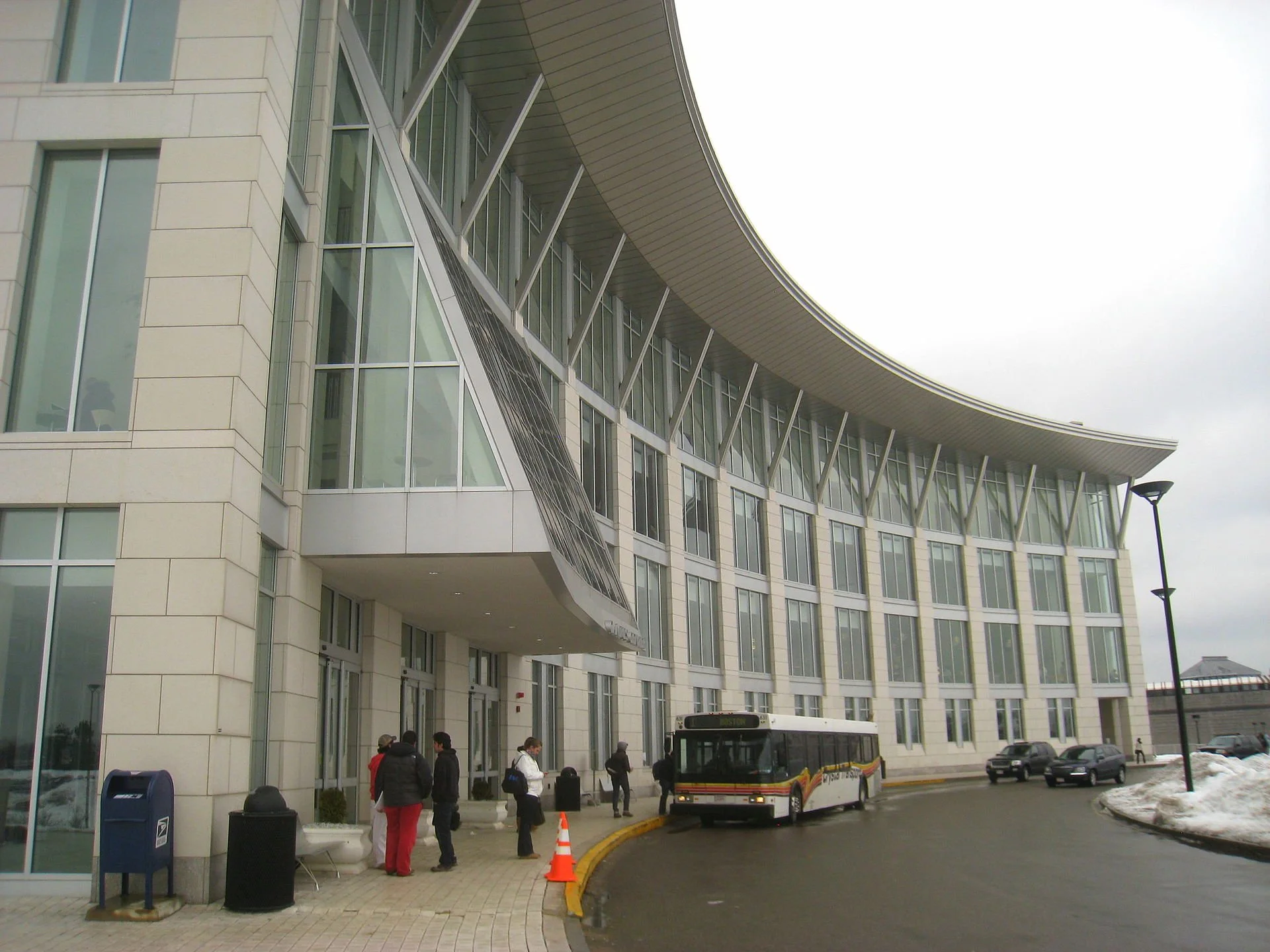Amy Collinsworth: Amid attacks on Critical Race Theory, UMass Boston launches new institute
The UMass Boston campus from Squantum Point Park, in Quincy.The brick building in the foreground is Wheatley Hall and the white building to its right is the Campus Center.
— Photo by Fullobeans
From The New England Journal of Higher Education, a service of The New England Board of Higher Education (nebhe.org)
BOSTON
Since the murders of George Floyd, Breonna Taylor, Ahmaud Arbery and Tony McDade in 2020, among countless others, the leadership of the University of Massachusetts at Boston has publicly committed itself to becoming an antiracist and health-promoting university. The university’s stated institutional values and commitments are also intricately tied to an academic freedom that wholly defends the right to teach about race, gender and other equity issues—matters that speak directly to the lived experiences of those in our university and Boston communities.
Currently, more than 30 states have enacted bans or have bans pending related to teaching about Critical Race Theory (CRT), equity and race and gender justice. Additionally, more than 100 organizations have signed the Joint Statement on Legislative Efforts to Restrict Education about Racism and American History, a statement by the American Association of University Professors, PEN America, the American Historical Association and the Association of American Colleges & Universities, which expresses opposition to these legislative bans and emphasizes a commitment to academic freedom that includes teaching about racism in U.S. history.
While anti-CRT legislation is not currently pending in Massachusetts, there have been and remain real threats to racial justice in Boston by entities other than the state. The recent contention in Boston Public Schools about exam school admission and the defunding of Africana Studies at UMass Boston, for example, demonstrate the need for individuals, departments and organizations to commit to racial justice.
For more than 30 years, the Leadership in Education Department at UMass Boston has demonstrated its commitment to social justice in education, in part, by supporting educators for leadership roles in education, policy and community organizations. Our academic programs include Educational Administration (MEd and Certificate of Advanced Graduate Study), Higher Education (PhD and EdD) and Urban Education, Leadership and Policy Studies (PhD and EdD). As a collective, our community of faculty, students, staff and alumni is committed to research and practice that is grounded in equity, organizational change for racial justice and collaborative leadership.
Launching a new institute
As our department reflects on the changes we want to make in relation to community and racial justice, we are excited to start a new initiative that opens our department community beyond the structures of our academic programs: the Educational Leadership and Transformation Institute for Racial Justice. The institute will focus on building capacity and sustainability to transform schools, colleges and universities for racial equity.
This institute aligns with a resolution recently approved at UMass Boston to defend academic freedom to teach about race and gender justice. The institute’s programs and workshops will address issues of racial justice in education, including in teaching, learning, administration and policy. This institute makes actionable our department’s commitment to building capacity for addressing racism, whiteness and racial equity in educational institutions.
The Educational Leadership and Transformation Institute for Racial Justice is an extension of our department’s social and racial justice commitments, responding to the political and policy context in the U.S., our state and our own institution. This context includes attacks on CRT and ethnic studies at all levels and, in our own UMass Boston community, public charges of racism, defunding of our ethnic institutes and disagreement over mission and vision statement drafts on the university’s commitment to becoming an antiracist and health-promoting institution.
In the Leadership in Education Department at UMass Boston, where people of color comprise the majority of students and faculty, academic freedom is understood as central to a racial justice commitment. This is why we recently brought a resolution to our faculty governance process. The resolution, “Defending Academic Freedom to Teach About Race and Gender Justice and Critical Race Theory,’’ received a favorable vote from the UMass Boston Faculty Council. In addition to other efforts to advance racial justice within our department, throughout UMass Boston and in our professional and personal lives, we now turn to what we can do to uphold this resolution as a department through this institute.
Commitment to racial justice
With hundreds of graduates from our programs, many of whom continue to work and live in New England, our students, alumni and faculty truly lead education throughout this region. Many hold roles across public and private education, including as principals, college presidents, deans, consultants, teacher leaders, faculty members, teachers, board of trustee members, directors, elected officials and district and university administrators. As scholar-practitioners, our students explore dissertation topics that center on issues of educational equity.
The same is true of the research and scholarship that our faculty members pursue. Our members conduct research on a variety of equity-focused topics in K-12, higher education and public policy, such as African-centered education; the schooling experiences and educational and life outcomes of Black women and girls; power dynamics and conflict in the academic workplace; how students pay for college; faculty members’ work-life experiences; the design and implementation of equity reforms; critical race theory in higher education; community-engaged teaching, learning and research; developmental education; and identity-conscious leadership. We are a community committed to leadership for change.
In recent years, our department has collaborated in new ways to examine how we want to live in congruence with our social and racial justice values. Since June 2020 and the murder of George Floyd, many members of our department community have gathered as The Cypher. The Cypher is a group of students, staff and faculty who support each other in their work to advance racial justice. In our organic gatherings, we focus on healing, wholeness and taking action against racism and whiteness at the University of Massachusetts Boston.
We continue to engage in activism on our own campus, including building capacity for promoting racial justice by strengthening coalitions with other groups at UMass Boston who are also promoting racial justice. This includes several of the ethnic institutes at UMass Boston and the Undoing Racism Assembly, a university-wide group of students, staff, faculty and administrators who address different racial justice concerns on campus. We also host events for our community, like the recent “Cypher Presents” dialogue between education scholars and policymakers about current matters of educational equity impacting area educational institutions and communities.
The Cypher
We began our work in The Cypher with a document, authored by 70 people, The Cypher Report. In alignment with our administration’s commitment to antiracism and health promotion, this report calls on UMass Boston administration to take specific steps to address institutionalized inequities within our organization. In addition to supporting the restorative justice framework put forth by Africana Studies, The Cypher Report made more than 20 demands, including:
Restoring funding for the Institute for Asian American Studies (IAAS), the Institute for New England Native American Studies (INENAS), the Mauricio Gastón Institute for Latino Community Development and Public Policy, and the William Monroe Trotter Institute for the Study of Black History and Culture and rescinding the glide path toward requiring the institutes to be “self-sufficient.”
Hiring an external consultant to meet individually with each senior level administrator, dean, and department chair to assess their current understanding of the ways racism and whiteness are perpetuated at UMass Boston.
Developing a racial-equity dashboard and report card to monitor and identify inequities to improve campus racial climate and equitable educational/work experiences for the university community.
Restore the Leadership in Education Department to its full-time faculty baseline (specifically, fill the seven faculty vacancies in the department).
Our efforts to institutionalize change for racial equity as a Cypher and department—in response to the larger context highlighted above—are evident through the recent resolution we brought to the UMass Boston Faculty Council, “Defending Academic Freedom to Teach About Race and Gender Justice and Critical Race Theory’’.
Attacks on CRT have been waged through state legislation and the former federal Equity Gag Order that banned federal employees, contractors and grant recipients from addressing concepts including racism, sexism and white supremacy. In the past year, the African American Policy Forum, led by Kimberlé Crenshaw, has asked faculty councils across the U.S. to unite with those affected by this legislation. After presentations from several members of The Cypher and me, the UMass Boston Faculty Council voted to pass this resolution that rejects “any attempts by bodies external to the faculty to restrict or dictate university curriculum on any matter, including matters related to racial and social justice.” (For the full resolution, see the December 2021 Faculty Council meeting minutes.)
The resolution calls us to question what racial and gender justice mean in education, and our institute is one response to that call. Through our programs and workshops in the Educational Leadership and Transformation Institute for Racial Justice, we especially look forward to conversations among and beyond our campus community to explore the ways we engage in this work. For example, how do students feel when their cultures, histories and experiences are represented within courses taught by faculty who use a CRT lens or focus on highlighting matters of racial justice and gender justice in their classrooms? What are the implications for tenure and promotion when faculty do or do not center racial justice, gender justice and intersectionality in their scholarship? For staff members who participate in professional development related to racial and gender justice, how is participation perceived in relation to professional advancement? How often are budget decisions called into question when their focus is on initiatives of racial and gender justice? As educators and community members, we must use critical questions such as these to consider the meaning of our work beyond symbolic or performative actions if we believe equity matters.
Amy E. Collinsworth is graduate program manager and assistant to the department chair in the Leadership in Education Department at the University of Massachusetts Boston, where she is also a doctoral candidate in the Higher Education Program.
At the UMass Boston Campus Center.

